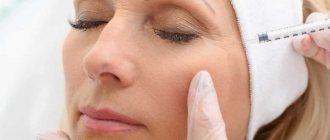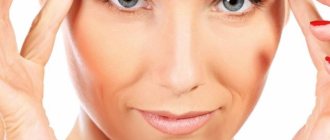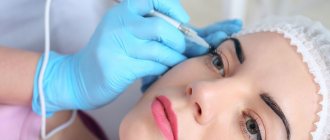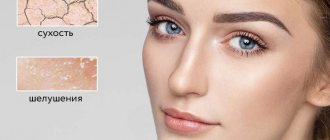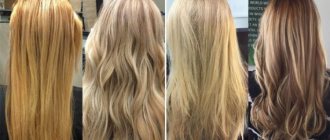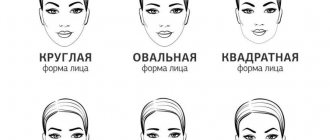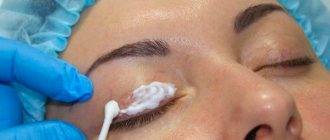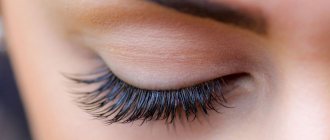Recommendations after Botox in the forehead and eyes
Recommendations after Botox injections extend to several days before the procedure and several weeks after. There are general rules that must be followed when performing injections on any part of the face, including the forehead and eyes, these include:
- due to the lack of data on the body’s reaction when Botox is combined with muscle relaxants and antipsychotics, you should refrain from using them;
- Avoid taking medications that impair blood clotting;
- do not take antibacterial drugs, as they not only reduce effectiveness, but can also lead to unpredictable consequences;
- avoid direct sunlight, visiting baths and saunas, solariums and hot baths - procedures that increase body temperature;
- at least one month before and after the procedure, do not perform myostimulation, microcurrent therapy, laser or chemical peels;
- Avoid taking alcoholic beverages and alcohol-containing medications;
- on the first day it is necessary to increase the activity of the facial muscles: frown, smile, grimace, this will allow the drug to be evenly distributed and penetrate the muscle fibers;
- a common problem for patients is swelling, which can be avoided by limiting drinking and foods containing large amounts of salt;
- exclude any physical activity, do not bend down or forward;
- It is not recommended to fly on an airplane on the first day after the procedure due to strong pressure changes;
- Do not touch your face with your hands, massage or apply pressure to the treated areas, as such actions may interfere with the even distribution of Botox;
- stay only in an upright position for 6-8 hours.
When deciding to have Botox injections in the forehead and eyes, you must be prepared to follow recommendations and restrictions that do not cause inconvenience or discomfort in your life. The main recommendations concern the first days after the procedure; it is their adherence that, for the most part, contributes to long-lasting action and quick results.
What not to do after injections, how to care for your skin after injections - rehabilitation
Long before deciding to do Botox, you should figure out what you will have to give up after the procedure, how to care for your skin and decide whether you are ready to change your usual lifestyle in order to remove a few wrinkles.
Caring for the dermis is as follows. Immediately, as soon as botulinum toxin enters the body, the muscles relax, but the actual effect after the procedure can be seen after a few hours, and in order for the substance to act as it should, certain conditions will have to be met.
The first few hours after the injection, the patient should only be in an upright position. In addition, the injections themselves should also be done in a sitting or semi-sitting position. This is necessary so that the muscles relax as much as possible.
In the video, what not to do after the Botox procedure:
After the injection, it is forbidden to touch the injection sites, massage, or even simply wipe the skin. During the day, you cannot do any cosmetic procedures, heat the skin, and even avoid warm air (for example, you cannot blow-dry your hair), and you should protect yourself from physical activity.
In order to avoid swelling, in the first days after the procedure you need to eat less food, which can retain water in the body, and limit fluid intake. It is necessary to avoid spicy and salty foods and not to take medications that thin the blood. The rehabilitation period will take about 3 weeks. You can find out if Botox is harmful to hair by following this link.
To make the body’s adaptation process go faster, try to smile, frown, and grimace more during the first day, that is, work your facial muscles as actively as possible, this will help the botulinum toxin to be distributed more evenly over the face.
Alcohol is strictly contraindicated both before and after the procedure. If you drink alcohol on the day of injections, you may experience bruises and hematomas. Alcohol dilates blood vessels and blood circulation becomes more intense, and this will lead to Botox being washed away throughout the tissues, and there will be no effect on the face. Cosmetic procedures are also contraindicated for some time, and if you are planning physical therapy, you must first consult with an experienced specialist.
In the first few weeks after Botox injections, you should not exercise, go to saunas and steam rooms, sunbathe, or be in places where your body temperature may rise. Airplane travel is prohibited, as the difference in pressure will have a detrimental effect on the effect of the procedure.
As for medications, some of them can negate Botox injections, while others, on the contrary, enhance the effect. Therefore, you need to have a good understanding of the drugs or consult a doctor about each pill. Most likely, any specialist will advise you not to take any pills at all for 3 weeks. The same is true with vitamins, especially B vitamins. Even with pain, it is necessary to avoid analgesics; herbal decoctions and infusions are also contraindicated.
Recommendations after Botox on the forehead
Usually, the recommendations after Botox are the same for all areas of the face, including the forehead. The main condition after injections in the forehead is the refusal of physical activity, since active muscle activity can contribute to the rapid elimination of the drug, which will lead to a lack of effect. Any activity: bending over, lifting heavy objects or even house cleaning increases blood circulation, causing blood vessels to dilate. Such actions lead to uneven distribution of botulinum toxin and, as a consequence, to the development of negative consequences, including:
- increased body temperature;
- fatigue and weakness;
- decreased appetite;
- increased heart rate;
- facial asymmetry.
A week after Botox injections, you can lightly exercise, gradually increasing the load. Returning to the gym and lifting weights is allowed only after 1.5-2 months.
Another recommendation when performing Botox injections into the forehead and other areas of the face is to prohibit the use of certain medications. If medication treatment is necessary, you should consult a cosmetologist. But there are a number of drugs that must be excluded due to the high risk of complications, these include:
- psychoactive drugs - affect muscle and nervous activity, which leads to a decrease in the effectiveness of Botox injections;
- vitamin B – regulates the activity of the nervous system and protects cells from damage, which prevents wrinkles on the forehead from completely smoothing out;
- painkillers - affect blood clotting, which leads to the appearance of hematomas at the puncture site;
- antibiotics with a bactericidal effect - block muscle function, which, in combination with Botox injections, can lead to unpredictable consequences;
- antibiotics - reduce the effectiveness of the drug.
Before undergoing the procedure, the doctor warns that there are certain rules that must be followed. Only following the recommendations will allow wrinkles on the forehead to smooth out and prevent the development of complications.
How to behave after a Botox procedure
Despite the fact that Botox or Dysport injections are considered safe and do not cause any complications, you should follow the recommendations of doctors. You should not undergo the procedure immediately while taking certain groups of antibiotics; you should refrain from performing it during pregnancy and breastfeeding. After the first visit to the cosmetologist, the specialist will give recommendations on how to prepare, but most importantly, how to behave after the Botox procedure , because at this time you will not be under the supervision of a doctor. Everything depends only on you.
Each body can react differently to the injected drug, so each person has a different reaction. Some may not feel anything, while others experience some sensations during the onset of the botulinum toxin drug. They pass quickly, the main thing is to listen to the urgent recommendations of the cosmetologist so that everything goes without complications.
What side effects can there be after injections?
In the first hours, sometimes during the day, the patient feels discomfort caused not by the action of botulinum toxin, but by injury from the needle. Some patients are so worried and afraid before the first procedure that after undergoing it they even notice a headache and flu-like symptoms, but after a short period of time everything went away. When it gets into the vessel, a hematoma appears, which is extremely rare during the Botox procedure, since there are very few injections and the risk of getting into the vessel is not as great as, for example, with mesotherapy.
What to do after a Botox or Dysport injection?
The best option is to go shopping. After Botox, it is not recommended to take a horizontal position or stand at an angle for 4 hours, so a walk around the city and shopping will help to distract you.
After the injection there are no restrictions on the work of the facial muscles. You can frown, smile, raise your eyebrows. In general, grimace as you do in everyday life.
On the first day, it is important not to go to sports, not to swim in the pool, not to visit the sauna and not to steam in a hot bath. This will prevent migration of the drug to other areas. It is also necessary to refrain from drinking excessive alcohol.
What should you not do after Botox?
Before getting Botox on your lips, make sure you do not have an appointment with your dentist on the same day. After the injection, you should not “disturb” the injection area too much. For the same reason, it is not recommended to undergo other cosmetic procedures in the facial area on the same day after the botulinum toxin procedure. Body massage should also be postponed for at least one day, since during it you will have to lie on your stomach; a rush of blood to the face is also not desirable on the day of Botox injection.
It is better to completely avoid fitness, harvesting, mopping floors and other activities that require frequent and prolonged bending in the first 24 hours.
Some medications may neutralize or enhance the expected effect. If you are taking antibiotics, neurotropic drugs or B vitamins, tell your cosmetologist before the injection.
In the summer, immediately after the injection, it is advisable to apply sunscreen to prevent even the slightest possibility of post-traumatic pigmentation in the injection area. Just make it a habit to use sunscreen.
It is necessary to abstain from alcohol in the first days.
Try to do all your household chores in advance so that there is no need to iron, cook dinner or clean the flooring. Don't bend over too often!
Avoid contact with hot or too cold. Massages are strictly contraindicated. For the first day, it is better not to touch the area where the drug was injected with your hands.
If you want the effect of botulinum toxin to last as long as possible, you need to avoid all cosmetic procedures on the face that can cause a rush of blood to the skin. These include active massages, microcurrents, and radiofrequency effects. All procedures that have a long-term warming effect.
Many people are interested in the issue of hygiene. Is it possible to take a bath after Botox? It is possible, starting from the second day after the injection and if it is not a very long steaming. Bath, sauna, hot shower, bath - all this will contribute to faster removal of botulinum toxin.
You can use cosmetics, wash your face and apply makeup the very next day.
Conclusion
If we sum it up, we can highlight a few simple rules that will help avoid consequences and extend the life of the drug.
All unpleasant sensations (redness, burning, tooth in the injection area) disappear within 48 hours. Therefore, do not use any irritating cosmetics, massage, or irritate the skin.
The sun's rays negatively affect the condition of the skin.
Medicines and vitamins will bring your next visit to a cosmetologist closer. Just like a sauna with a steam bath, and steam with a hot shower.
The most important ones are the first day. During this period, you will have to deny yourself a lot, but you will not need to go to an appointment with a cosmetologist ahead of schedule.
Experienced, qualified specialists at our clinic will help you properly prepare for Botox injections. Their professionalism will allow you to avoid the risk of undesirable consequences, and consultations will help preserve and extend the effect of botulinum toxin.
